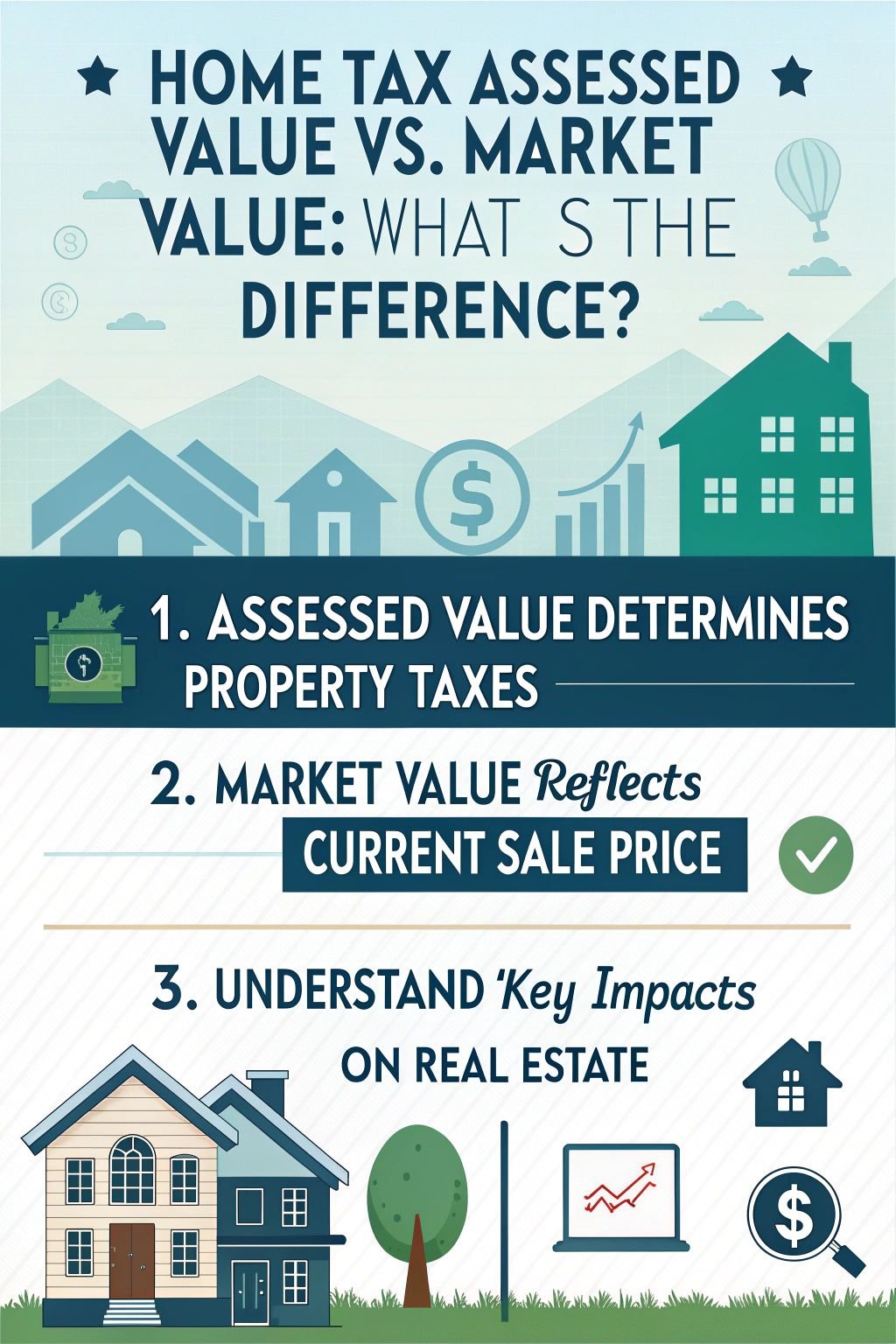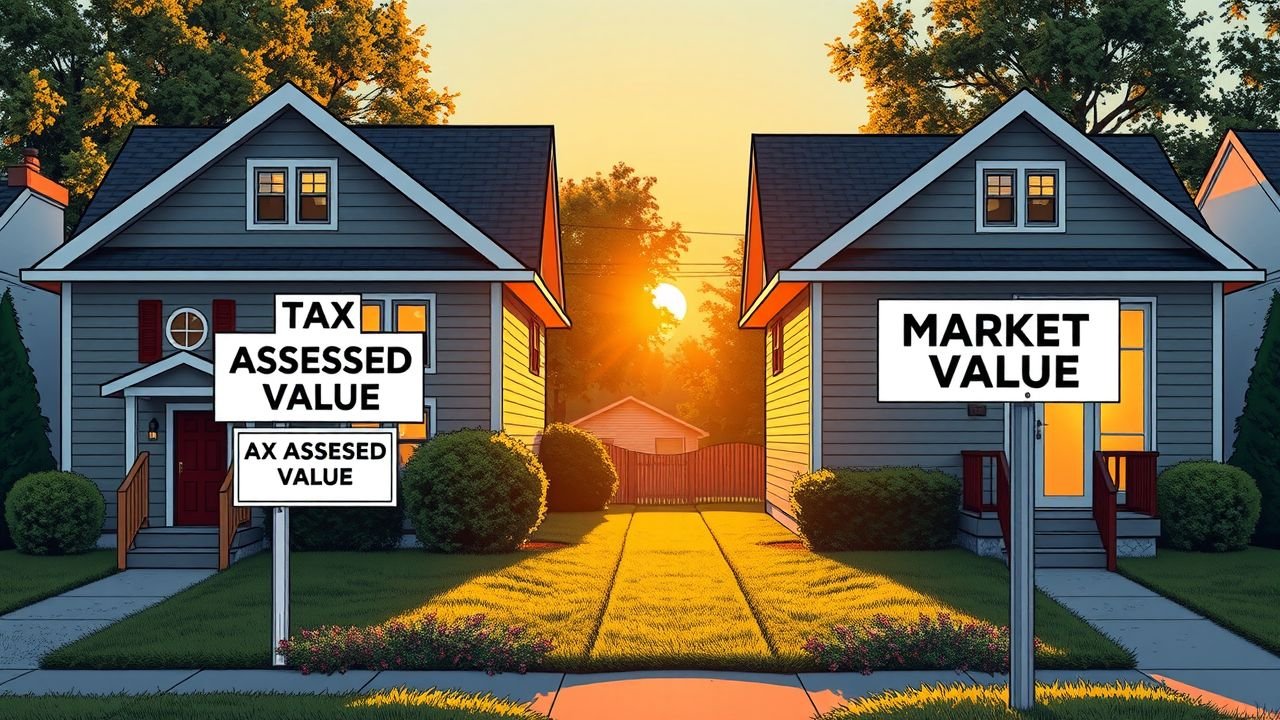Are you confused about the difference between your home’s tax assessed value and its market value? You’re not alone. Many homeowners struggle to understand these two important figures and how they impact their property taxes and home sale prospects.
In fact, according to a recent survey, over 60% of homeowners don’t know the difference between assessed value and market value.
This article will clear up the confusion and help you become an informed homeowner. We’ll explain what tax assessed value and market value mean, how they’re calculated, and why understanding the difference matters.
By the end, you’ll have a better grasp of your home’s value and how it affects your finances. Ready to dive in?
Key Takeaways
- Tax assessed value is used by local governments to calculate property taxes, while market value represents the current price a home would likely sell for on the open market. Assessed values are typically 80-90% of market values.
- Tax assessors determine assessed value using mass appraisal, considering factors like square footage, location, and recent sales. Market value is determined by a professional appraiser‘s detailed evaluation of the property’s unique features, condition, and current market trends.
- Understanding the difference between assessed and market value is crucial for homeowners. It impacts property taxes (avg. $2,375/year in the U.S.), and helps make informed decisions when buying or selling a home. Homeowners can appeal high assessments to potentially lower tax bills.
- Economic factors like interest rates, job growth, and consumer confidence influence market values. Online tools provide rough estimates, but local real estate professionals offer the most accurate assessments based on specific market knowledge.
- Recognizing the disparity between assessed and market values allows sellers to price homes competitively and buyers to make informed offers without overpaying based on inflated assessments. Staying informed about both values is key to making smart real estate decisions.

Home Tax Assessed Value Vs. Market Value: What’s The Difference?

Do you know the difference between your home’s tax assessed value and its market value? While they both relate to your property’s worth, they serve distinct purposes and can vary significantly.
Tax assessed value is used by local governments to calculate property taxes, while market value represents the price your home would likely sell for on the open market based on current conditions, comparable properties, and an appraiser’s evaluation.
Understanding these key differences is crucial for homeowners to make informed decisions about their property and finances.
Home Tax Assessed Value Vs. Market Value: What’s The Difference?
What is Tax Assessed Value?
The tax assessed value is the dollar value assigned to your property by the local government for the purpose of calculating property taxes. This value is determined by the tax assessor’s office, which evaluates factors such as the size, location, condition, and any upgrades or improvements made to your home.
As Margie Cusack from the International Association of Assessing Officers explains, “The assessed value is based on the legal framework set by state laws and local ordinances.”.
The assessed value is based on the legal framework set by state laws and local ordinances. – Margie Cusack, International Association of Assessing Officers
The tax assessed value directly impacts the amount of property taxes you owe, which help fund essential public services like schools, police and fire departments, and road maintenance.
It’s important to note that the frequency of reassessments can vary depending on your location, with some areas conducting annual assessments while others may reassess every few years.
What is Market Value?
Market value represents the price a willing buyer would pay for your home in the current real estate market. It’s determined by analyzing recent sales of similar properties in your area, along with factors like square footage, condition, upgrades, and location.
Real estate agents and appraisers use comparative market analysis (CMA) to estimate your home’s market value. They look at the selling prices of comparable homes that have recently sold, making adjustments for any differences.
Market value can fluctuate based on supply and demand. In a seller’s market with low inventory and high demand, you may see home values rise. Conversely, in a buyer’s market with plentiful inventory, market values may decrease.
Understanding your home’s market value is crucial whether you’re buying, selling, refinancing, or seeking a home equity loan. It’s the price you can expect to receive if you list your property for sale.
When setting an asking price, you and your real estate agent will consider the appraised market value, but also assess current market conditions. What are homes like yours selling for right now? How quickly are they selling? Are there more buyers than available homes, or vice versa? Answering these questions will help you gauge your home’s true market value in the present real estate climate.
Ultimately, the market value is what a buyer is willing to pay for your specific property in the current market.
Key Differences Between Tax Assessed Value and Market Value
Tax assessed value and market value are two distinct ways to measure a home’s worth. Understanding the key differences between these two values is crucial for homeowners, buyers, and sellers:
- Tax assessed value is used by local governments to calculate property taxes, while market value represents the current price a property would likely sell for on the open market.
- Tax assessors determine the assessed value using a mass appraisal system, considering factors like square footage, location, and recent sales of similar properties in the area. In contrast, market value is determined by a professional appraiser who conducts a detailed evaluation of the specific property, analyzing its unique features, condition, and current market trends.
- Assessed values are typically lower than market values, often ranging from 80% to 90% of the market value. This discrepancy exists because tax assessments may not keep pace with rapidly changing market conditions, such as rising home prices in a hot real estate market.
- While market value can fluctuate significantly based on supply and demand, assessed values tend to be more stable and change less frequently. Local governments usually reassess property values every one to five years, depending on the jurisdiction.
- Assessed values are a matter of public record and can be easily accessed by homeowners. Market values, on the other hand, are not always publicly available and may require a professional appraisal or a comparative market analysis by a real estate agent.
- If a homeowner believes their assessed value is too high, they can appeal the assessment and potentially lower their property tax bill. However, disputing a market value is more difficult, as it is based on a professional appraiser’s opinion and current market conditions.
- When buying or selling a property, market value plays a more significant role in determining the price. Assessed value, while important for tax purposes, has less influence on real estate transactions.
How Are Tax Assessed Values Calculated?
Tax assessors calculate your home’s assessed value using a variety of methods. They consider the size, age, location, and features of your property, as well as recent sales of similar homes in your area.
Assessors also factor in any renovations or improvements you’ve made that could increase your home’s value. They may even estimate the cost to rebuild your home from scratch, taking into account current construction costs and building materials.
Your local government sets the property tax rate, which is then applied to your home’s assessed value to determine your annual property tax bill. Tax rates can vary widely depending on where you live, so a higher assessed value in one area might result in lower taxes than a lower assessed value in another.
If you think your home’s assessed value is too high, you can appeal it through your local tax collector’s office. Providing evidence of lower comparable sales or pointing out errors in the assessment could help lower your tax bill.
What Determines Market Value?
Market value is the price a property would sell for in a competitive and open market. Real estate professionals, such as appraisers and agents, determine market value by analyzing recent sales of similar homes in the area.
They consider factors like the property’s size, age, condition, and location, as well as current market trends and demand. For instance, if a 1,500 square foot, 3-bedroom, 2-bathroom home in good condition recently sold for $300,000 in your neighborhood, a comparable property would likely have a similar market value.
Economic factors, such as interest rates, job growth, and consumer confidence, also play a role in determining market value. When the economy is strong and demand for housing is high, market values tend to increase.
On the other hand, during economic downturns or periods of oversupply, market values may stagnate or even decrease. Online tools like Zillow’s Zestimate and Redfin’s Estimate can provide a rough idea of your home’s market value, but for the most accurate assessment, consult with a local real estate professional who has in-depth knowledge of your specific market.
Understanding your home’s market value is crucial when it comes to making informed decisions about buying, selling, or refinancing your property.
5. Why Understanding the Difference Matters for Homeowners.
Why Understanding the Difference Matters for Homeowners
As a homeowner, grasping the distinction between market value and assessed value is crucial. Your home’s assessed value directly impacts your annual property tax bill, with the average U.S. homeowner shelling out around $2,375 per year.
By understanding how these values are calculated, you can budget more effectively and even dispute an assessed value if it seems too high, potentially saving you money on taxes.
When buying or selling a home, knowing the difference between market and assessed values is essential. The market value, determined by factors like location, condition, and recent sales of similar properties, is what buyers are typically willing to pay.
On the other hand, the assessed value is used for tax purposes and may not reflect the current market. Recognizing this disparity can help you price your home competitively when selling and make informed offers when buying, ensuring you don’t overpay based on an inflated assessment.
Conclusion
In the end, you should grasp the key differences between tax assessed value and market value for homes. Tax assessed values help calculate property taxes, while market values show what buyers will likely pay.
As a homeowner, knowing both gives you crucial insights into your home’s worth and tax obligations. Stay informed about these values to make smart decisions when buying, selling, or owning a home.
Your awareness of these distinct but related figures will serve you well in all your real estate endeavors.
FAQs
1. What’s the difference between a home’s assessed value and market value?
A property’s assessed value is determined by the local government for tax purposes, while the market value is the price a buyer would likely pay for the home in the current real estate climate. The assessed value is often a percentage of the market value.
2. How is the market value of a home determined?
Real estate professionals determine a home’s market value by evaluating factors like the property’s condition, square footage, location, and comparing it to similar recently sold homes in the area. Market value can change based on supply and demand in the local housing market.
3. Why is it important to know both the assessed and market values of a property?
Understanding both values is crucial for homeowners. The assessed value determines property taxes owed, while the market value helps sellers set a competitive asking price and buyers make informed offers. Knowing these figures can also help property owners appeal their assessed value to potentially lower their tax bill.
4. Can the assessed value and market value of a home be the same?
While assessed and market values can be similar, they are often different. Assessed values may lag behind market values, especially in rapidly appreciating or depreciating housing markets. Local governments typically reassess property values periodically, not annually.
5. How does the condition of a home affect its market value?
A home’s condition significantly impacts its market value. Well-maintained properties with modern updates typically command higher prices than those needing repairs or renovations. Buyers consider the cost of necessary improvements when determining an offer price.
6. What role do assessed and market values play in buying and selling real estate?
When selling a home, owners often consider its assessed and market values to determine a competitive listing price. Buyers use market value to gauge whether a home is fairly priced and to inform their offers. In hot markets, homes may sell above their assessed values, while in slower markets, they may sell closer to or below the assessed values.




















